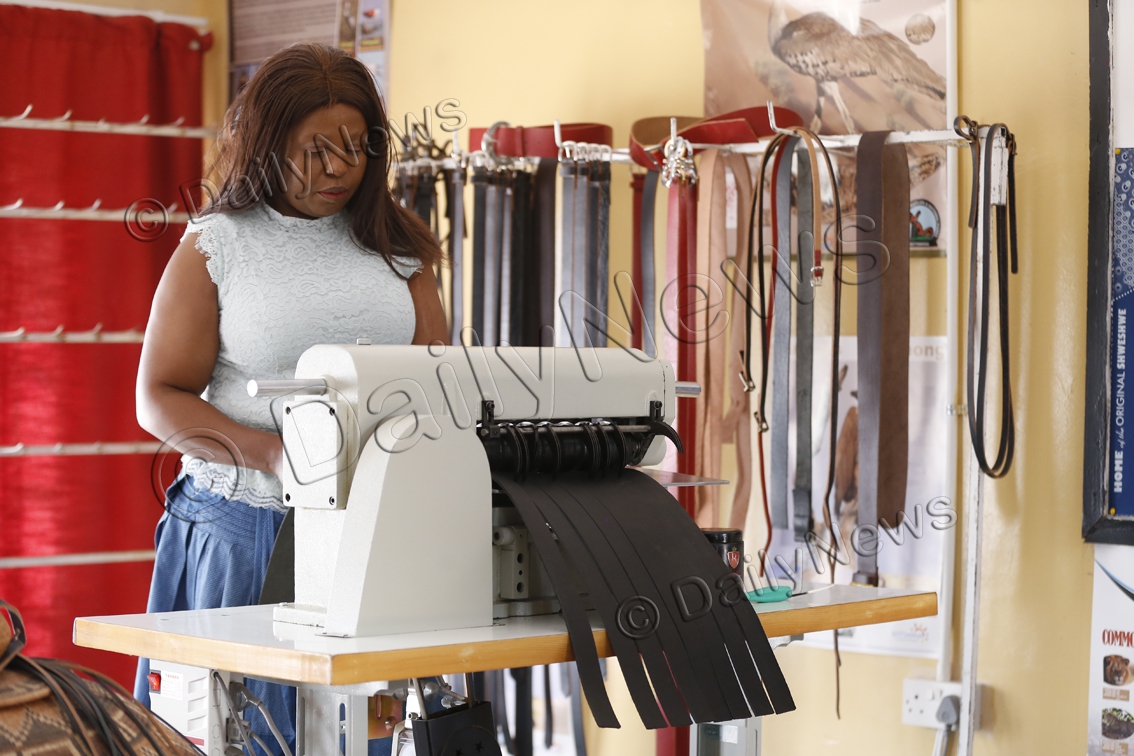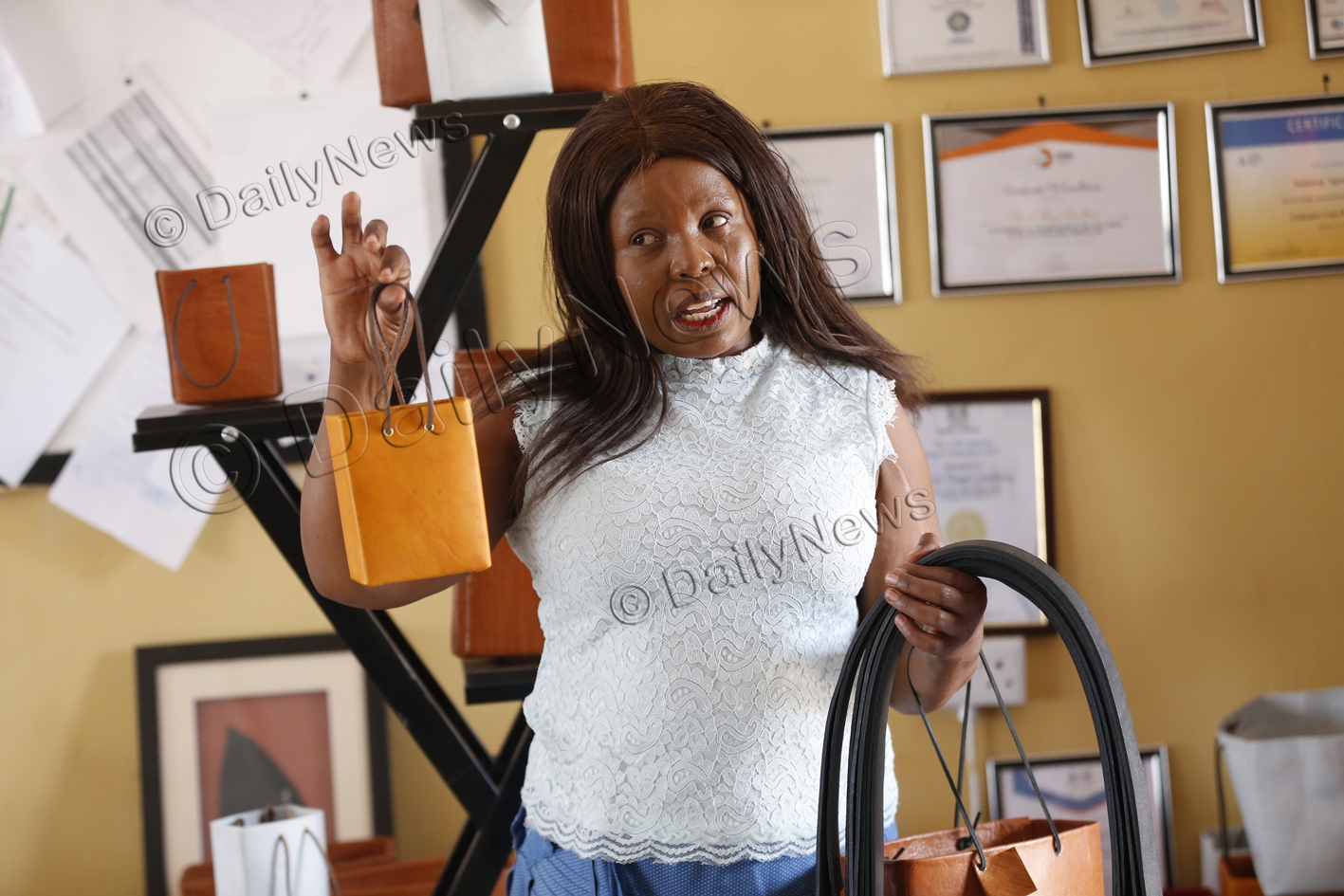Abattoir sparks hope for entrepreneur
15 Apr 2024
Anticipation swirls in the hearts of the Kgalagadi community members, as the completion of the Tsabong Multispecies Abattoir draws closer.
Among those eagerly awaiting its opening is Tumisang Ngwanathebe, a female entrepreneur with a passion for leather processing.
Hailing from Makopong, Ms Ngwanathebe’s journey into the world of leather craftsmanship began in her teenage years.
Inspired by her mother’s skills in crafting leather into household decorations, she began experimenting with the material herself. What started as a hobby soon evolved into a full-fledged career.
“I grew up in a family of farmers who survived on tanning and preserving leather and my passion grew from there and I decided to go commercial,” said Ms Ngwanathebe.
In an interview, the 49- year-old said her self-funded business called Skin and Things Consultancy, which started in 2010, used animal skins to manufacture various products.
From exquisite gift bags, umbrellas to belts and sleek accessories made from animal skins, each product exudes sophistication and reflects Ms Ngwanathebes’s meticulous attention to detail.
Despite her lack of formal business training, Ms Ngwanathebe sought guidance from the Ministry of Agriculture, obtaining certification in leatherwork in order to kick start her business.
“Subsequently, I diversified my expertise by acquiring accreditation to become a trainer and assessor from the then Botswana Training Authority (BOTA), now known as Botswana Qualifications Authority (BQA),” she said.
In addition to processing leather products, she trains other people to gain the necessary skills to also manufacture leather merchandise,” she said.
Outlining her creative process, Ms Ngwanathebe says she uses only organic raw materials on her products.
“The creative process involved in making a leather product typically encompasses several stages, each requiring careful consideration and attention to detail,” she explained.
She said the steps involved included design conceptualisation, material selection, pattern making, cutting and assembling.
“Throughout the manufacturing process, quality control measures are implemented to ensure that the finished product meets the desired standards of craftsmanship and quality,” she said.
Ms Ngwanathebe further stated that what sets her apart was not just her impeccable craftsmanship, but also her commitment to sustainability and ethical practices.
“The dye that I use to tan the beautiful colours on my products is sourced from local trees such as mositsane also known as Elephanttorrhiza burkei, which is common in sandy areas,” she said.
However, she is swift to point out that she harvests the tree in a sustainable way.
“I do not want to contribute to the deforestation, so I am very strategic in the way I pick which tree to use,” she said.
Additionally, Ms Ngwanathebe procures animal skins from reputable sources including butcheries and ceremonial events such as funerals and weddings, ensuring ethical sourcing practices are adhered to.
Despite her manual manufacturing methods, she boasts an impressive production capacity of 5 000 leather belts per day.
“Machines would be of great use so that I get a higher output,” she said.
Challenges still persist in Ms Ngwanathebe’s entrepreneurial journey, notably the scarcity of dedicated employees within her line of work.
Reflecting on this hurdle, she urged fellow Batswana, particularly women, to cultivate a spirit of self-reliance and endeavour into entrepreneurship by leveraging government initiatives such as funds from the gender affairs department and Chema Chema.
Moreover, Ms Ngwanathebe’s aspirations extend beyond commercial success; she envisions becoming a prominent figure in the country’s business landscape, spearheading efforts to replace plastic shopping bags with environmentally friendly leather alternatives in major supermarkets.
“Matlalo ke teemane ya bobedi ya lefatshe,” she stated, advocating for a paradigm shift towards prioritising indigenous industries and drawing inspiration from nations that cherished their leather heritage.
Looking ahead, Ms Ngwanathebe reveals plans for expansion, with Tsabong Landboard granting her a business plot.
She said UNDP had agreed to fund her so that she could finally construct her own workshop.
In Ms Ngwanathebe’s journey, the merging of tradition, innovation, and resilience in the leather works industry embodies the spirit of the country’s entrepreneurial landscape, offering a beacon of hope amidst the arid plains of the Kgalagadi. ENDS
Source : BOPA
Author : Taboka Ngwako
Location : MAUBELO
Event : FEATURE
Date : 15 Apr 2024







